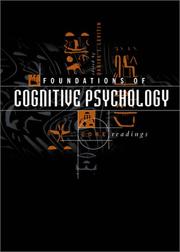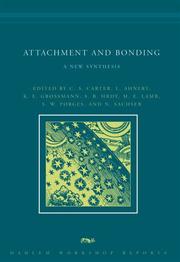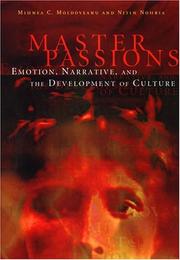| Listing 1 - 10 of 189 | << page >> |
Sort by
|
Book
ISBN: 1108481566 1108674283 1108632742 110862412X 9781108632744 9781108624121 9781108674287 Year: 2023 Publisher: Cambridge, United Kingdom ; New York, NY, USA : Cambridge University Press,
Abstract | Keywords | Export | Availability | Bookmark
 Loading...
Loading...Choose an application
- Reference Manager
- EndNote
- RefWorks (Direct export to RefWorks)
The thalamus is a key structure in the mammalian brain, providing a hub for communication within and across distributed forebrain networks. Research in this area has undergone a revolution in the last decade, with findings that suggest an expanded role for the thalamus in sensory processing, motor control, arousal regulation, and cognition. Moving beyond previous studies of anatomy and cell neurochemistry, scientists have expanded into investigations of cognitive function, and harness new methods and theories of neural computation. This book provides a survey of topics at the cutting edge of this field, covering basic anatomy, evolution, development, physiology and computation. It is also the first book to combine these disciplines in one place, highlighting the interdisciplinary nature of thalamus research, and will be an essential resource for students and experts in biology, medicine and computer science.
Thalamus. --- Optic thalamus --- Brain --- Diencephalon --- PSYCHOLOGY / Cognitive Psychology & Cognition
Book
ISBN: 9780262535106 0262535106 Year: 2018 Publisher: Cambridge (Mass.) : The MIT Press,
Abstract | Keywords | Export | Availability | Bookmark
 Loading...
Loading...Choose an application
- Reference Manager
- EndNote
- RefWorks (Direct export to RefWorks)
Amos Tversky (1937-1996) was a towering figure in the cognitive and decision sciences. His work was ingenious, exciting, and influential, spanning topics from intuition to statistics to behavioral economics. His long and extraordinarily productive collaboration with his friend and colleague Daniel Kahneman was the subject of Michael Lewis's best-selling book, The Undoing Project: A Friendship that Changed Our Minds. The Essential Tversky offers a selection of Tversky's best, most influential and accessible papers, "classics" chosen to capture the essence of Tversky's thought. The impact of Tversky's work is far reaching and long-lasting. In 2002, Kahneman, who drew on their joint work in his much-praised 2013 book, Thinking, Fast and Slow (and who contributes an afterword to this collection), was awarded the Nobel Prize in Economics for work done with Tversky. In The Undoing Project, Lewis (who contributes a foreword to this collection) describes his discovery that Tversky and Kahneman's thinking laid the foundation for Moneyball, his own ode to number-crunching. The papers collected in The Essential Tversky cover topics that include cognitive and perceptual bias, misguided beliefs, inconsistent preferences, risky choice and loss aversion decisions, and psychological common sense. Together, they offer nonspecialist readers an introduction to one of the most brilliant social science thinkers of the twentieth century.
Cognition. --- Cognitive psychology. --- Decision making. --- PSYCHOLOGY / Cognitive Psychology.
Book
ISBN: 9780230295377 Year: 2012 Publisher: Houndmills, Basingstoke, Hampshire : Palgrave Macmillan,
Abstract | Keywords | Export | Availability | Bookmark
 Loading...
Loading...Choose an application
- Reference Manager
- EndNote
- RefWorks (Direct export to RefWorks)
"Psychology is a discipline that comprises various schools of thought, with each taking a different position on key issues, such as ethics and the nature vs. nurture debate. In this concise introduction, Fairholm focuses on the biological, behaviorist, cognitive, psychodynamic, and humanist approaches, and explores the differences in their standpoints"--
PSYCHOLOGY / Cognitive Psychology. --- PSYCHOLOGY / General. --- PSYCHOLOGY / History. --- Psychology.

ISBN: 0262122472 0262621592 9786612099823 1282099825 026227826X 0585446539 9780262278263 9780585446530 9780262122474 9780262621595 Year: 2002 Publisher: Cambridge (Mass.) MIT
Abstract | Keywords | Export | Availability | Bookmark
 Loading...
Loading...Choose an application
- Reference Manager
- EndNote
- RefWorks (Direct export to RefWorks)
Scientists from many disciplines, including physics, chemistry, biology, and neuroscience, contribute to the study of cognition. Cognitive psychology, the science of the human mind and of how people process information, is at the core of empirical investigations into the nature of mind and thought. This anthology is based on the assumption that cognitive psychology is at heart empirical philosophy. Many of the core questions about thought, language, perception, memory, and knowledge of other people's minds were for centuries the domain of philosophy. The book begins with the philosophical foundations of inquiry into the nature of mind and thought, in particular the writings of Descartes, and then covers the principal topics of cognitive psychology including memory, attention, and decision making. The book organizes a daunting amount of information, underlining the essentials, while also introducing readers to the ambiguities and controversies of research. It is arranged thematically and includes many topics not typically taught in cognition courses, including human factors and ergonomics, evolutionary psychology, music cognition, and experimental design. The contributors include Daniel Dennett, Daniel Kahneman, Jay McClelland, Donald Norman, Michael Posner, Stephen Palmer, Eleanor Rosch, John Searle, Roger Shepard, and Anne Treisman.
Book
ISBN: 0262261049 0262281392 143566566X Year: 2008 Publisher: Cambridge, MA : MIT Press,
Abstract | Keywords | Export | Availability | Bookmark
 Loading...
Loading...Choose an application
- Reference Manager
- EndNote
- RefWorks (Direct export to RefWorks)
How understanding the signaling within social networks can change the way we make decisions, work with others, and manage organizations.How can you know when someone is bluffing? Paying attention? Genuinely interested? The answer, writes Alex Pentland in Honest Signals, is that subtle patterns in how we interact with other people reveal our attitudes toward them. These unconscious social signals are not just a back channel or a complement to our conscious language; they form a separate communication network. Biologically based "honest signaling," evolved from ancient primate signaling mechanisms, offers an unmatched window into our intentions, goals, and values. If we understand this ancient channel of communication, Pentland claims, we can accurately predict the outcomes of situations ranging from job interviews to first dates.Pentland, an MIT professor, has used a specially designed digital sensor worn like an ID badge--a "sociometer"--to monitor and analyze the back-and-forth patterns of signaling among groups of people. He and his researchers found that this second channel of communication, revolving not around words but around social relations, profoundly influences major decisions in our lives--even though we are largely unaware of it. Pentland presents the scientific background necessary for understanding this form of communication, applies it to examples of group behavior in real organizations, and shows how by "reading" our social networks we can become more successful at pitching an idea, getting a job, or closing a deal. Using this "network intelligence" theory of social signaling, Pentland describes how we can harness the intelligence of our social network to become better managers, workers, and communicators.
Book
ISBN: 0262377284 0262377292 0262547104 Year: 2024 Publisher: Cambridge, Massachusetts : The MIT Press,
Abstract | Keywords | Export | Availability | Bookmark
 Loading...
Loading...Choose an application
- Reference Manager
- EndNote
- RefWorks (Direct export to RefWorks)
"The Elephant and the Blind is a book about why we need a new culture of consciousness, and how to get it. A culture of consciousness (or Bewusstseinskultur) is a culture that values and cultivates the mental states of its members in an ethical and evidence-based way"--
Book
ISBN: 1433841126 Year: 2023 Publisher: Washington, D. C. : American Psychological Association,
Abstract | Keywords | Export | Availability | Bookmark
 Loading...
Loading...Choose an application
- Reference Manager
- EndNote
- RefWorks (Direct export to RefWorks)
For courses on the psychology of learning, a comprehensive look at the theories of conditioning and learning.

ISBN: 0262195224 0262693518 0262283735 1423726642 9780262283731 9781423726647 9780262693516 9780262195225 Year: 2005 Publisher: Cambridge, Mass. MIT
Abstract | Keywords | Export | Availability | Bookmark
 Loading...
Loading...Choose an application
- Reference Manager
- EndNote
- RefWorks (Direct export to RefWorks)
In Panpsychism in the West, the first comprehensive study of the subject, David Skrbina argues for the importance of panpsychism--the theory that mind exists, in some form, in all living and nonliving things--in consideration of the nature of consciousness and mind. Despite the recent advances in our knowledge of the brain and the increasing intricacy and sophistication of philosophical discussion, the nature of mind remains an enigma. Panpsychism, with its conception of mind as a general phenomenon of nature, uniquely links being and mind. More than a theory of mind, it is a meta-theory--a statement about theories of mind rather than a theory in itself. Panpsychism can parallel almost every current theory of mind; it simply holds that, no matter how one conceives of mind, such mind applies to all things. In addition, panpsychism is one of the most ancient and enduring concepts of philosophy, beginning with its pre-historical forms, animism and polytheism. Its adherents in the West have included important thinkers from the very beginning of Greek philosophy through the sixteenth and seventeenth centuries to the present.Skrbina argues that panpsychism is long overdue for detailed treatment, and with this book he proposes to add impetus to the discussion of panpsychism in serious philosophical inquiries. After a brief discussion of general issues surrounding philosophy of mind, he traces the panpsychist views of specific philosophers, from the ancient Greeks and early Renaissance naturalist philosophers through the likes of William James, Josiah Royce, and Charles Sanders Peirce--always with a strong emphasis on the original texts. In his concluding chapter, "A Panpsychist World View," Skrbina assesses panpsychist arguments and puts them in a larger context. By demonstrating that there is panpsychist thinking in many major philosophers, Skrbina offers a radical challenge to the modern worldview, based as it is on a mechanistic cosmos of dead, insensate matter. Panpsychism in the West will be the standard work on this topic for years to come.
Philosophical anthropology --- Esoteric sciences --- Panpsychism --- History. --- History --- Animism --- Consciousness --- Philosophy --- Hylozoism --- COGNITIVE SCIENCES/General --- COGNITIVE SCIENCES/Psychology/Cognitive Psychology

ISBN: 0262033488 0262528541 9786612097973 0262269961 1282097970 1423769872 9780262269964 9781423769873 9780262033480 9781282097971 6612097973 Year: 2005 Volume: *18 Publisher: Cambridge (Mass.) MIT Press
Abstract | Keywords | Export | Availability | Bookmark
 Loading...
Loading...Choose an application
- Reference Manager
- EndNote
- RefWorks (Direct export to RefWorks)
"In this Dahlem workshop report, scientists from different disciplines-including anthropology, psychology, psychiatry, and behavioral biology-come together to explore the concepts of attachment and bonding from diverse perspectives. In their studies they seek to understand the causes or the consequences of attachment and bonding in general and their different qualities in individual development in particular. They address such questions as biobehavioral processes in attachment and bonding; early social attachment and its influences on later patterns of behavior; bonding later in life; and adaptive and maladaptive (or pathological) outcomes."--Publisher's description.

ISBN: 0262280086 058544255X 0262263769 9780585442556 9780262280082 9780262134057 Year: 2002 Publisher: Cambridge, Mass. MIT Press
Abstract | Keywords | Export | Availability | Bookmark
 Loading...
Loading...Choose an application
- Reference Manager
- EndNote
- RefWorks (Direct export to RefWorks)
An exploration of the powerful role of anxiety, ambition, and envy in shaping both our individual lives and society as a whole. At the heart of the human experience lies anxiety caused by the realization that the world is unknown, forever eluding our control. And out of this anxiety arises the master passions of ambition and envy, which we repress to mask their power over our lives. Discussion of the role of the emotions in our lives is not new, but Mihnea Moldoveanu and Nitin Nohria go much further, showing how these passions shape not only our individual lives but our social and organizational culture as well. The master passions are not pretty, and so we cover them with the more socially acceptable faces of reason and morality. Moldoveanu and Nohria guide the reader in revealing the real impetus behind such actions as firing a friend, leaving a lover, or even pillaging your own people. Below the rational explanation, they show, often lies a willingness to hurt or even destroy others to fuel our own ambitions or quench the fires of envy. The authors offer intriguing thought experiments and examples from their own lives as they expose the power of the master passions. Deftly weaving ideas from psychology (Sigmund Freud), sociology (Max Weber), literature (William Shakespeare, Albert Camus), and philosophy (David Hume, Adam Smith, Karl Marx, Friedrich Nietzsche) with the personal, they build a strong argument that society would be much healthier if we faced the deception and self-deception that pervade our lives.
Emotions --- Ambition. --- Envy. --- Social aspects. --- Aspiration (Virtue) --- Deadly sins --- Jealousy --- Virtues --- COGNITIVE SCIENCES/Psychology/Cognitive Psychology --- PHILOSOPHY/General
| Listing 1 - 10 of 189 | << page >> |
Sort by
|

 Search
Search Feedback
Feedback About UniCat
About UniCat  Help
Help News
News